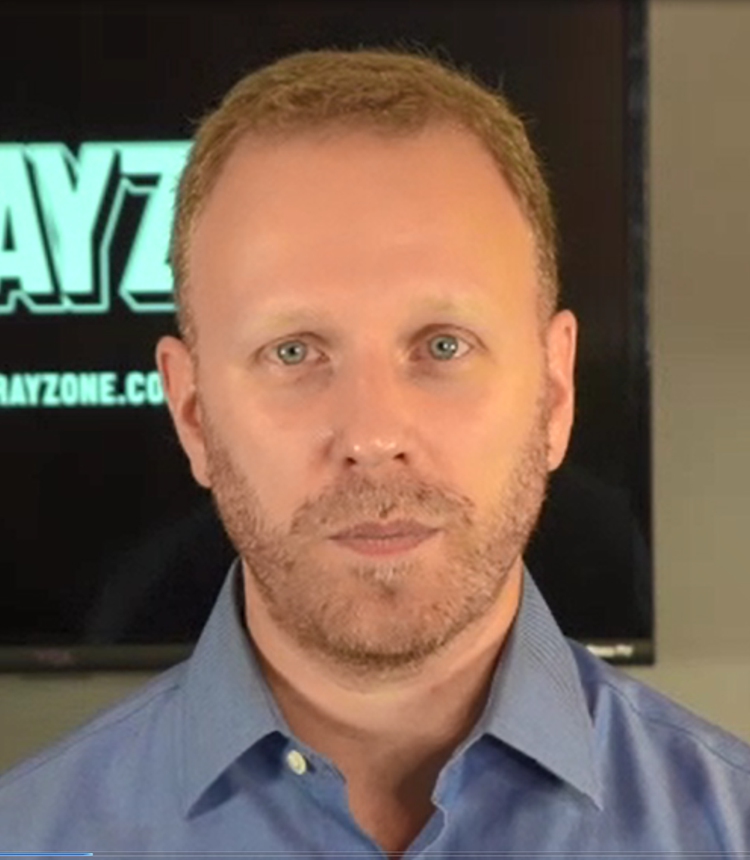During the past decade, the world has increasingly witnessed a trend of “the East is rising while the West is declining” in the spheres of economy, security and discourse power. Western countries, particularly the US, plagued by internal woes, have sought the old path of passing the buck and instigating turmoil elsewhere to ease their own pressure. China, representative of the emerging countries, is proposing new solutions to global problems. By advocating win-win development, facilitating consultation and reconciliation and proposing a balanced and effective security mechanism, China is striving to build a community with a shared future for mankind.
Max Blumenthal, editor and founder of the Grayzone, a US-based independent news outlet, talked to Global Times (GT) reporter Lu Yuanzhi about his views on the lies fabricated by the US government over Xinjiang as well as the so-called Western-style press freedom.
GT: The Grayzone is now popular around the world. Amongst Chinese, it is mainly popular for reporting the truth about Xinjiang and exposing lies fabricated by the US government. What changes do you think the life of ordinary people in Xinjiang have experienced over the last decade?
Blumenthal: The question of what people in Xinjiang really think and believe needs to be determined by journalists on the ground there and by actual average citizens speaking to the international press.
We have shown how when CNN goes there, they are not actually interested in telling that story. They’re pursuing a very particular narrative and using deceptive means to arrive at a predetermined objective, as they did in their special on supposedly missing Uyghur children.
With limited resources, The Grayzone has shown how the story being told from Xinjiang to the US by supposed survivors and witnesses is deeply flawed at best, and highly deceptive at worst. The voices consistently quoted in Western media have been taken through a corridor of intelligence sponsored organizations, starting in Kazakhstan and arriving in Washington, where they all function under the umbrella of the World Uygur Congress, which is itself sponsored by the US government through the National Endowment for Democracy. These testimonies are designed to advance the narrative of the new cold war and the case for “genocide” against China.
One particular example is Tursunay Ziyawudun, who has changed her story multiple times in US media. First she told Western media no one laid a hand on her, then, after arriving in Washington, she began claiming she was brutally tortured. Despite the discrepancies, she is still constantly featured in mainstream reports about Xinjiang.
And we know that there’s a precedent for this, a very dangerous precedent: the case of Nayirah, who was the daughter of the Kuwaiti ambassador to the US, put up to testify before Human Rights Caucus, chaired by Congressman Tom Lantos, a fanatically pro-Israel Democrat who was determined to secure a regime change war against the government of Iraq.
George W. Bush pushed Nayirah’s false allegation that Iraqi troops were taking Kuwaiti premature babies out of incubators and killing them. It was a lie that was concocted by over a dozen public relations firms. By the time that the falsehood was exposed, the story had already been presented to the US, not only by president Bush, but by Amnesty International, which later retracted it. By then, the damage was done. This testimony was lynchpin of the case for attacking Iraq, which ultimately led to the second gulf war, the destruction of a large part of the Middle East and the rise of ISIS that we’re still facing today.
So it’s not for us about some core ideological commitment to the Chinese government. It’s about preventing these destructive conflicts that leave the planet in an irreparable state. And we are currently walking on a razor’s edge right now, with the kind of liberal interventionist ideologues surrounding Biden right now, who want to inflame this conflict around the Taiwan Straits.
GT: An increasing number of countries are aware that the US’ smears on China’s governance in Xinjiang and its political operations to suppress China are driven by political ends. Adrian Zenz’s background has also been revealed by the Grayzone, whilst most Muslim countries have expressed their support for China on the issue. Do you think the US will continue to make noise on Xinjiang-related issues? What means will the US resort to?
Blumenthal: The US may make noise about Xinjiang, but we are in a new era in the US that is forcing the leadership of this country and its population to turn increasingly inward toward a focus on the civil and cultural war that has raged throughout this country’s history. On January 6, 2021, the US experienced a riot in the US Capitol by supporters of Donald Trump that the Democrats in Congress and the White House and no shortage of establishment Republicans portrayed as a high-level insurrection. There is a massive irony here, as these same figures have encouraged insurrections around the globe, including the violent attack on the Hong Kong parliament by US-backed rioters.
Up until January 6, all focus had been on Russia, and to a lesser extent, China, as the subversive forces that sought to destabilize US government. After January 6, the US political establishment and the security state adopted a laser-like focus on the pro-Trump movement as domestic enemies. Biden has openly identified it as the greatest national security threat the country faces. This not only dissipates the anti-China energy that actually unites a broad swath of the US public, from big city liberal Democrats to Rust Belt Republicans; it sets the stage for a civil conflict centered around future elections and mass security state dragnets to prevent it. In this scenario, the US public and media is going to be more focused on their enemies in Birmingham and Boston than in Beijing.

Max Blumenthal Photo: screenshot
GT: Julian Assange could face up to 175 years in prison for exposing US war crimes and may be extradited to the US soon. Your work also involves exposing facts that the US government does not want to publicize. Does Assange’s suffering make you worry about yourself? Have you ever been threatened by any forces?
Blumenthal: The persecution of Julian Assange has utterly obliterated the concept of the US as a shining city on a hill, as Reagan said. The source of America’s moral power is its First Amendment, the freedom of press, the freedom of association and its cultural openness. Everything that the figure of Assange locked in a glass box in a British kangaroo court exposes as a gigantic fraud.
A country like Russia does not pretend to be the leading democracy of the world like the US does. It does not have a First Amendment like the US does that guarantees free speech. For Russia’s leadership, stability is more important to its population than individual freedoms, especially given their own experiences in the 1990s. In Russia, a journalist named Ivan Safronov, a former defense reporter for the Kommersant and Vedomosti, was recently sentenced to 22 years in prison for national security related crimes. I won’t claim to know all the facts of his case. Safronov’s employers and many media outlets in Moscow protested vehemently against his sentence. However, if the US seeks to protest this jailing and lecture the Kremlin, the Russian government can justifiably point to Assange, who is absolutely innocent. That is what I call the Assange effect.
Then you have supposed liberal democracies like Denmark, which is considered freer than the US. There, in the past year, several journalists have been summoned by state security agencies for interrogations, because they published leaks that contained classified material.
In a liberal democracy with freedom of speech, it has been considered commonplace and acceptable for journalists to publish classified material by journalists. And in the US, outlets from the New York Times to Washington Post published stories based on classified materials brought to light by Assange’s WikiLeaks. But now, with Assange’s imprisonment, I believe supposed liberal democracies feel emboldened to go after journalists that upset the security state by publishing classified materials. Once again, it’s the Assange effect.
It is also important to mention that Julian Assange is not even a citizen of the US. He is being held in a foreign prison on the orders of the US, like other people who have been kidnapped on the high seas or in the skies by the US, like the Venezuelan diplomat, Alex Saab. He is now in a federal prison in Miami area where he will be charged with violating US sanctions to support his own country’s economy.
The US is actually kidnapping non-citizens abroad. So this threatens everyone on the planet who the US national security state deems a threat, including foreign journalists.
As for me at the Grayzone, yes, I have experienced targeting by the British, and I would assume the US intelligence services, for our publication of factual journalism.
We recently published a video of a British intelligence officer named Ross Burley, who works in the Foreign Office, declaring that we should be censored for our reporting and falsely calling us a Russian disinformation site or Russian propaganda site – a completely false claim. But we have also published leaked emails showing campaigns being organized in the UK involving intelligence officials and journalists to try to destroy us.
I have also experienced being jailed for several days on false charges that were cooked up by political opponents – members of the right-wing Venezuelan opposition. They just went to the police invented a charge against me. My house was surrounded by police. They demanded to enter my house at 9:00 am and took me to jail for over two days. As I was going to trial, the charges were dropped without explanation.
Obviously the stakes for Assange are much higher than for me. Speaking to his family members, they’re concerned that he will be killed or simply driven insane in prison in the UK before he even arrives in the US, which is seeking his extradition. So those of us who are advocating for his freedom are literally fighting to save his life.
GT: Compared with US mainstream corporate media such as CNN and Fox, what is the influence of independent media like the Grayzone on US society?
Blumenthal: Influence is difficult to quantify, and we certainly cannot do what CNN or the New York Times or others do, which is to actually wage psychological warfare on the public and move them in support of official goals. What’s so significant about what we call mainstream or corporate media in the US is the discipline that the reporters demonstrate in pushing the population toward the realization of official objectives. It’s truly amazing to witness how few reporters are willing to dissent even slightly from the state’s line.
What we are doing is simply disrupting the singular and monotonous narrative imposed on English populations. I think we have been successful in this regard. We have built up a large grass-roots audience with modest resources and a small collection of contributors and staff. I also measure our influence in terms of the attacks we get, which are very high-level and often take the form of calls for our total censorship. These attack campaigns originate from Western governments, as well as their friends and cut-outs in the media and politics. And I wear that as a badge of honor. We have also built trust with our audience by being open about our political beliefs, while mainstream media poses as objective while aggressive advancing partisan and official goals, which intelligent media consumers view not only as deceptive, but insidious.
GT: Some believe that the US has also launched a cognitive war against China and Russia in addition to political, military and economic means. Taking advantage of its strengths in media and network, the US attempts to influence the public’s judgment on the right and wrong of specific events, and then tries to influence public opinion. Do you think the US’ such kind of cognitive warfare can confuse right and wrong in Russia-Ukraine conflict and cross-Straits tensions?
Blumenthal: The US has delusions of waging a kind of psychological or cognitive war against the populations of the countries that it sees as its competitors and mobilizing them against their governments. Russia and China are obviously its top targets. At the same time, the US foreign policy establishment is egging on the Baltic states to ban Russian citizens and initiating sanctions against Russia that have forced a pullout of the most powerful sources of US soft power: Netflix and McDonald’s. As the US and EU seek to exclude Russia from the so-called international community, the patriotic impulses of the Russian population kicks in, and the public rallies around the flag and to a certain extent, the Kremlin. You can see the same trend among the Chinese public as the US escalates around Taiwan and pushes Japan to re-militarize.
Russia also has something that China doesn’t have, because China did not give in to the West after the collapse of the Soviet Union. And that is the experience of the 1990s, when 3 to 5 million of the Russian population were killed off by neoliberal austerity overseen by the Clinton administration. And because history is the best antidote to the kind of cognitive warfare campaigns that NATO openly boasts about waging, NATO is going to focus its efforts on the younger generations.
GT: Chinese media outlets have been labeled as “state media” on US social media platforms and are subject to many restrictions. Russian media are in a similar situation. Does this indicate that it is difficult for US business media to influence global public opinion as the US elites hope? How do you feel about the rise of non-Western English-language media outlets, such as the Global Times? How much of a challenge do their voices pose to the traditional media in the US and the West?
Blumenthal: First, this policy of social media in labeling outlets as Chinese government-affiliated media demonstrates the power that the Department of Homeland Security and the intelligence services have over Silicon Valley and over private media, which further weakens the power of the First Amendment.
Second, this trend demonstrates the fear not necessarily of Russia or China, but a fear of the American public itself. Because outlets like CGTN, Global Times and RT are counter-hegemonic media organizations that can present Americans with a different perspective. The national security regime here does not want those counter-hegemonic perspectives to reach the American public, because it will affect their decision-making and could lead toward the democratizing of foreign policy decisions. The American public is not supposed to be involved in critical decisions around diplomacy or war and peace. They are not supposed to consider the perspective of the designated enemy. That’s why the advent of sophisticated networks adopting a CNN-style aesthetic like RT America were treated as such a threat by the national security state.
The most outrageous aspect of these labels is how they’ve been applied to individual Twitter accounts, including Americans who might work at RT or CGTN even if they have their own outlets somewhere else. It’s a way of branding them as pariahs in US media, basically blacklisting them so that they can never be hired anywhere else, and thereby scaring off other Americans who might have taken a job at these organizations. And that’s just another means of breaking down the few remaining cultural and political bridges between our countries.
(Global Times)



